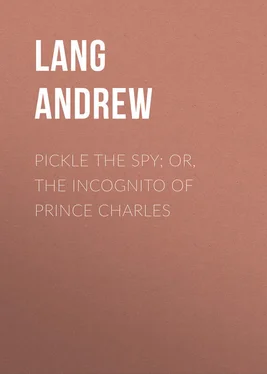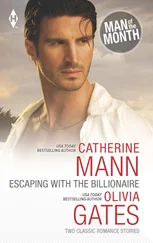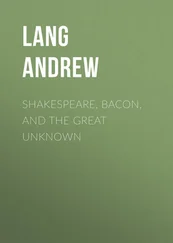Andrew Lang - Pickle the Spy; Or, the Incognito of Prince Charles
Здесь есть возможность читать онлайн «Andrew Lang - Pickle the Spy; Or, the Incognito of Prince Charles» — ознакомительный отрывок электронной книги совершенно бесплатно, а после прочтения отрывка купить полную версию. В некоторых случаях можно слушать аудио, скачать через торрент в формате fb2 и присутствует краткое содержание. Жанр: foreign_antique, foreign_prose, на английском языке. Описание произведения, (предисловие) а так же отзывы посетителей доступны на портале библиотеки ЛибКат.
- Название:Pickle the Spy; Or, the Incognito of Prince Charles
- Автор:
- Жанр:
- Год:неизвестен
- ISBN:нет данных
- Рейтинг книги:4 / 5. Голосов: 1
-
Избранное:Добавить в избранное
- Отзывы:
-
Ваша оценка:
- 80
- 1
- 2
- 3
- 4
- 5
Pickle the Spy; Or, the Incognito of Prince Charles: краткое содержание, описание и аннотация
Предлагаем к чтению аннотацию, описание, краткое содержание или предисловие (зависит от того, что написал сам автор книги «Pickle the Spy; Or, the Incognito of Prince Charles»). Если вы не нашли необходимую информацию о книге — напишите в комментариях, мы постараемся отыскать её.
Pickle the Spy; Or, the Incognito of Prince Charles — читать онлайн ознакомительный отрывок
Ниже представлен текст книги, разбитый по страницам. Система сохранения места последней прочитанной страницы, позволяет с удобством читать онлайн бесплатно книгу «Pickle the Spy; Or, the Incognito of Prince Charles», без необходимости каждый раз заново искать на чём Вы остановились. Поставьте закладку, и сможете в любой момент перейти на страницу, на которой закончили чтение.
Интервал:
Закладка:
Were there, then, no signs in his early life of the faults which grew so rapidly when hope was lost? There were such signs. As early as 1742, James had observed in Charles a slight inclination to wine and gaiety, and believed that his companions, especially Francis Strickland, 24 24 This gentleman died at Carlisle in 1745, according to Bishop Forbes. Jacobite Memoirs , p. 4.
were setting him against his younger brother, the Duke of York, who had neither the health nor the disposition to be a roysterer. 25 25 Stuart MSS. in Windsor Castle.
Again, on February 3, 1747, James recurs, in a long letter, to what passed in 1742, ‘because that is the foundation, and I may say the key, of all that has followed.’ Now in 1742 Murray of Broughton paid his first visit to Rome, and was fascinated by Charles. This unhappy man, afterwards the Judas of the cause, was unscrupulous in private life in matters of which it is needless to speak more fully. He was, or gave himself the air of being, a very stout Protestant. James employed him, but probably liked him little. It is to be gathered, from James’s letter of February 3, 1747, that he suspected Charles of listening to advice, probably from Murray, about his changing his religion. ‘You cannot forget how you were prevailed upon to speak to your brother’ (the devout Duke of York) ‘on very nice and delicate subjects, and that without saying the least thing to me, though we lived in the same house.. You were then much younger than you are now, and therefore could be more easily led by specious arguments and pretences… It will, to be sure, have been represented to you that our religion is a great prejudice to our interest, but that it may in some measure be remedied by a certain free way of thinking and acting.’ 26 26 Stuart Papers. Browne’s History of the Highland Clans , iii. 481.
In 1749 James made a disagreeable discovery, which he communicated to Lord Lismore. A cassette , or coffer, belonging to Charles, had, apparently, been left in Paris, and, after many adventures on the road, was brought to Rome by the French ambassador. James opened it, and found that it contained letters ‘from myself and the Queen.’ But it also offered proof that the Prince had carried on a secret correspondence with England, long before he left Rome in 1744. Probably his adherents wished James to resign in his favour. 27 27 James to Lismore. June 23, 1749. Stuart MSS.
As to religion, Dr. King admits that Charles was no bigot, and d’Argenson contrasted his disengaged way of treating theology with the exaggerated devoutness of the Duke of York. Even during the march into England, Lord Elcho told an inquirer that the Prince’s religion ‘was still to seek.’ Assuredly he would never make shipwreck on the Stuart fidelity to Catholicism. All this was deeply distressing to the pious James, and all this dated from 1742, that is, from the time of Murray of Broughton’s visit to Rome. Indifference to religious strictness was, even then, accompanied by a love of wine, in some slight degree. Already, too, a little rift in the friendship of the princely brothers was apparent; there were secrets between them which Henry must have communicated to James.
As for the fatal vice of drink, it is hinted at on April 15, 1747, by an anonymous Paris correspondent of Lord Dunbar’s. Charles had about him ‘an Irish cordelier,’ one Kelly, whom he employed as a secretary. Kelly is accused of talking contemptuously about James. ‘It were to be wished that His Royal Highness would forbid that friar his apartment, because he passes for a notorious drunkard.. and His Royal Highness’s character, in point of sobriety, has been a little blemished on this friar’s account.’ 28 28 Stanhope. Vol. iii. Appendix, p. xl.
The cold, hunger, and fatigue of the Highland distresses had, no doubt, often prompted recourse to the national dram of whiskey, and Charles would put a bottle of brandy to his lips ‘without ceremony,’ says Bishop Forbes. The Prince on one occasion is said to have drunk the champion ‘bowlsman’ of the Islands under the table. 29 29 Jacobite Memoirs .
What had been a jovial feast became a custom, a consolation, and a curse, while there is reason, as has been seen, to suppose that Charles, quite early in life, showed promise of intemperance. In happier circumstances these early tastes might never have been developed into a positive disease. James himself, in youth, had not been a pattern of strict sobriety, but later middle age found him almost ascetic.
We have sketched a character endowed with many fine qualities, and capable of winning devoted affection. We now examine the rapid decline of a nature originally noble.
Returned from Scotland in 1746, Prince Charles brought with him a head full of indigested romance, a heart rich in chimerical expectations. He now prided himself on being a plain hardy mountaineer. He took a line of his own; he concealed his measures from the spy-ridden Court of his father in Rome; he quarrelled with his brother, the Duke of York, when the Duke accepted a cardinal’s hat. He broke violently with the French king, who would not aid him. He sulked at Avignon. He sought Spanish help, which was refused. He again became the centre of fashion and of disaffection in Paris. Ladies travelled from England merely to see him in his box at the theatre. Princesses and duchesses ‘pulled caps for him.’ Naturally cold (as his enemies averred) where women were concerned, he was now beleaguered, besieged, taken by storm by the fair. He kept up the habit of drinking which had been noted in him even before his expedition to Scotland. He allowed his old boyish scepticism (caused by a mixed Protestant and Catholic education) to take the form of studied religious indifference. After defying and being expelled by Louis XV., he adopted (what has never, perhaps, been observed) the wild advice of d’Argenson (‘La Bête,’ and Louis’s ex-minister of foreign affairs), he betook himself to a life of darkling adventures, to a hidden and homeless exile. In many of his journeys he found Pickle in his path, and Pickle finally made his labours vain. The real source of all this imbroglio, in addition to an exasperated daring and a strangely secretive temperament, was a deep, well-grounded mistrust of the people employed by his father, the old ‘King over the water.’ Whatever James knew was known in London by next mail. Charles was aware of this, and was not aware that his own actions were almost as successfully spied upon and reported. He therefore concealed his plans and movements from James, and even – till Pickle came on the scene – from Europe and from England. The result of his reticence was an irremediable rupture between ‘the King and the Prince of Wales – over the water,’ an incurable split in the Jacobite camp.
The general outline here sketched must now be filled up in detail. The origo mali was the divisions among the Jacobites. Ever since 1715 these had existed and multiplied. Mar was thought to be a traitor. Atterbury, in exile, suspected O’Brien (Lord Lismore). The Earl Marischal and Kelly 30 30 The Kelly of Atterbury’s Conspiracy, long a prisoner in the Tower. It is fair to add that Bulkeley, Montesquieu’s friend, defended Kelly.
were set against James’s ministers, Lord Sempil, Lord Lismore, and Balhaldie, the exiled chief of the Macgregors. Lord Dunbar (Murray, brother of Lord Mansfield) was in James’s disgrace at Avignon. Sempil, Balhaldie, Lismore were ‘the King’s party,’ opposed to Marischal, Kelly, Sheridan, Lally Tollendal, ‘the Prince’s party.’ Each sect inveighed against the other in unmeasured terms of reproach. This division widened when Charles was in France, just before the expedition to Scotland.
Интервал:
Закладка:
Похожие книги на «Pickle the Spy; Or, the Incognito of Prince Charles»
Представляем Вашему вниманию похожие книги на «Pickle the Spy; Or, the Incognito of Prince Charles» списком для выбора. Мы отобрали схожую по названию и смыслу литературу в надежде предоставить читателям больше вариантов отыскать новые, интересные, ещё непрочитанные произведения.
Обсуждение, отзывы о книге «Pickle the Spy; Or, the Incognito of Prince Charles» и просто собственные мнения читателей. Оставьте ваши комментарии, напишите, что Вы думаете о произведении, его смысле или главных героях. Укажите что конкретно понравилось, а что нет, и почему Вы так считаете.












